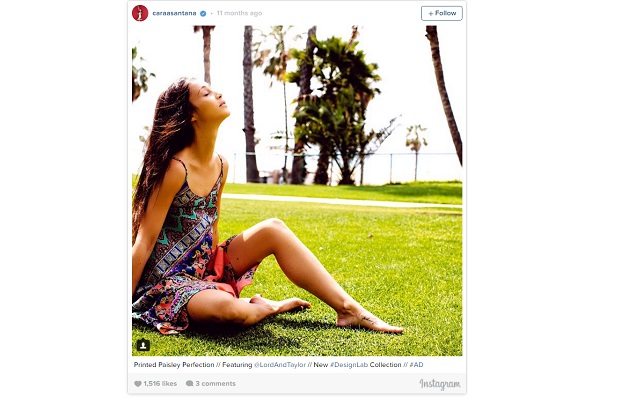A US fashion firm has settled a case in which it was accused of failing to flag paid Instagram endorsements as being adverts.
Photo source: Instagram
Lord & Taylor paid 50 online fashion “influencers” $1,000 to $5,000 to post Instagram pictures of themselves wearing the same dress without making it clear they were being paid to promote the item, the Federal Trade Commission said Tuesday.
Lord and Taylor is the USA’s oldest department store chain, a unit of Canadian retailer Hudson’s Bay Co.
The government body agency also said Lord & Taylor paid Nylon, an online fashion magazine, to post an article on its website and its Instagram account to talk up the dress, which was made for the chain’s 2015 Design Lab clothing collection.
“But again, there were no disclosures saying it was paid advertising,” the FTC said in a post on its blog.
“So while it looked like the magazine was giving an independent, fashion-forward recommendation about this dress, it was actually an ad in disguise.”
View two examples below:
Lord & Taylor is settling the agency’s charges that it deceived customers by paying for so-called native advertisements without proper disclosure.
Under the FTC’s consent order, the company is barred from suggesting that paid ads are from an independent source. It also must ensure that any influencers it pays to promote a product make clear that their endorsement has been bought and paid for.
“Lord & Taylor needs to be straight with consumers in its online marketing campaigns,” Jessica Rich, director of the FTC’s Bureau of Consumer Protection, said in a statement. “Consumers have the right to know when they’re looking at paid advertising.”
Lord & Taylor denies that it tried to deceive customers, claiming in a statement that “there is no finding of wrongdoing whatsoever” in the FTC’s order and that it cooperated with the agency.
“A year ago, when it came to our attention that there were potential issues with how the influencers posted about a dress in this campaign, we took immediate action with the social media agencies that were supporting us on it to ensure that clear disclosures were made,” the company said in a statement.
“The FTC has changed its guidelines since last year, and we applaud the new guidelines that clarify the rules,” Lord & Taylor added.
The settlement is the first regarding native advertising since the FTC issued guidelines in December, Lesley Fair, an attorney with the agency’s Bureau of Consumer Protection, told Reuters.
Native advertising is similar in format and topic to the content on a publisher’s site, and can be difficult for consumers to discern from a legitimate news article. The FTC rolled out guidelines in December clarifying its rules for native ads. Tuesday’s agreement with Lord & Taylor was the first such case under the
The UK’s Advertising Standards Authority has already taken action of its own against social media product placements.
In 2014, it reprimanded Oreo-maker Mondelez for contacting vloggers to promote its biscuits without revealing they had been paid to do so.

